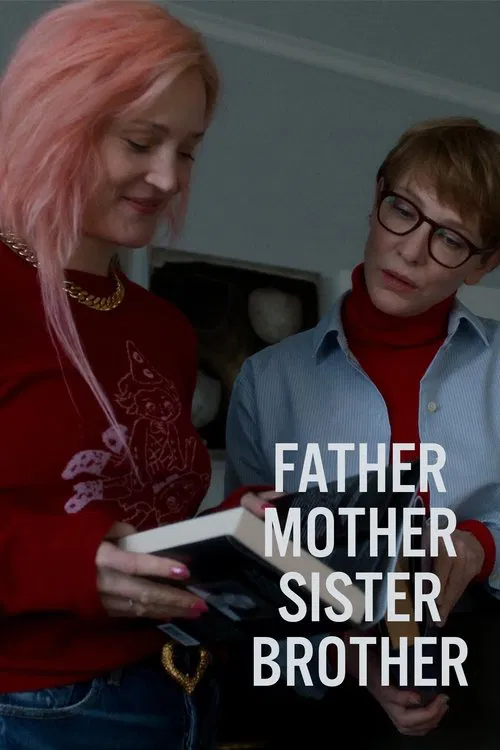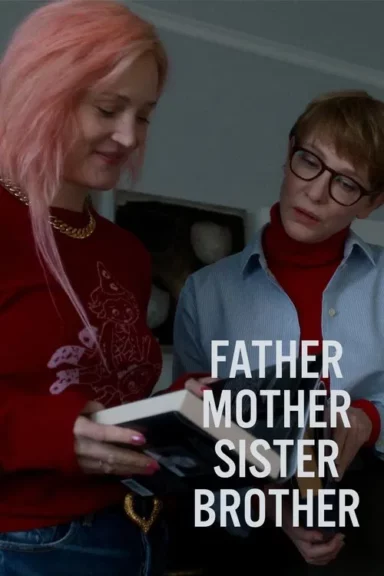
A film by Jim Jarmusch
With: Tom Waits, Adam Driver, Mayim Bialik, Charlotte Rampling, Cate Blanchett, Vicky Krieps, Sarah Greene, Indya Moore, Luka Sabbat, Françoise Lebrun
Three stories concerning the relationships between adult children, their somewhat distant parent (or parents), and each other: a reclusive father visited by his grown children in the US, sisters visiting their novelist mother in Dublin, and adult twins called back to their Paris apartment to address a family tragedy.
Our rate: **
Jim Jarmusch‘s Father Mother Sister Brother offers a kind of mirror image to Midnight on Earth 30 years later, in its revival of the formal process of immersing oneself in a city, capturing something of it, at a specific time and place. Here, Jarmusch replaces night scenes in a taxi in bustling cities, following eclectic characters who are a little lost but on the move, full of life and color, with observations of family reunions, most often linked to past pain and unspoken words. He gives us his thoughts on the family, what it has become today (we have no doubt that behind the darkness and misanthropy lies a fierce critical exercise) or, more precisely, the role it hardly plays anymore in his first two films. The third installment (Sister and Brother), less misanthropic, contrasts with the first two, which echoed each other. Finally, we see a functional family, where each member is there for the others, where communication flows freely, where they understand each other with a simple glance, even sharing jokes with great complicity, whereas the same joke (Bob is your uncle) was completely misunderstood in the first family scene, where a father who has remained rock ‘n’ roll and free is rejected by his bourgeois children, who attach great importance to appearances, which the old man (Tom Jones) likes to play on, again mirroring a more real situation, that of pretending that everything is fine when everything is wrong, in order to keep up appearances. The film plays on details, small touches, awkward silences, pretense, and the importance of family image. Above all, it plays on the unspoken words about past hurts. It questions the way we see things, the dysfunction of the family, the obligatory nature of the family, and the generation gap, the misunderstanding that can arise between a father and his children as a result of divorce, destructive behavior, or between two sisters who seem to be complete opposites. At times, especially in his depiction of the first two situations, we may wonder whether Jarmusch himself has aged, whether his sense of observation, his taste for marginal characters, or more precisely the vitality we find in them, has not faded somewhat. In his early days, Jarmusch expressed himself all the better because he was interested in the fringes, in those hours when the light shines on those who are left behind during the day. He managed to capture and convey all the hidden poetry, magnifying it with his own rock ‘n’ roll universe. But on closer inspection, and despite its bourgeois or minimalist appearance, the film can be seen as a condensed little manual, read like a short anti-bourgeois pamphlet, a call to wake up and look. A good film in itself, which, for the sake of glory, also makes small references to Jarmush’s more recent essays on the few motifs he likes to feed into his staging (formal symmetry, or twins, objects and situations that are found here and there—a Rolex, real or fake, skaters who are completely free from traffic rules). Artistically a step back from his most memorable films, Father Mother Sister Brother nevertheless marks Jarmusch’s desire to return to his first cinematic loves, to what nourished his early films: everyday life, the observation of what is happening right next to him, rather than a narrative fiction that has no connection with reality (no zombies or vampires, then, although Only Lovers Left Alive was very much in touch with reality). But like At work, and because it does not seek to distance itself from reality in terms of form, it would be more at home in the “everyday” film category, which is better appreciated in theaters than at festivals, where its place may be debatable.

